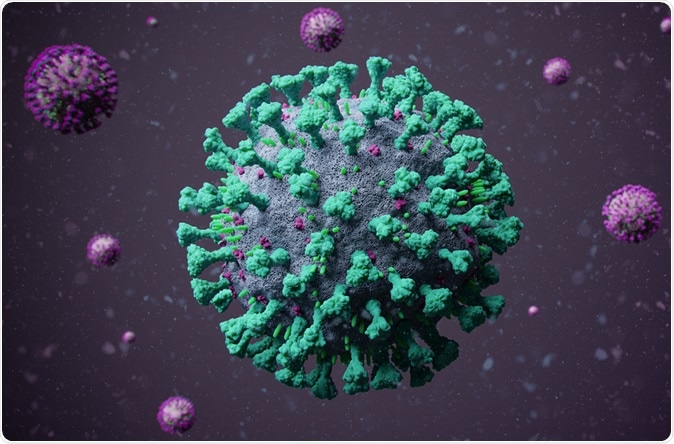Scientists across the globe are racing to develop a vaccine that can provide protection against coronavirus disease (COVID-19). An effective and safe vaccine would curb not only the current coronavirus pandemic but also prevent future outbreaks.
Just days after the U.S. biotechnology company Moderna reported promising results from its experimental vaccine for the novel coronavirus, a second breakthrough was announced in China.
The country’s candidate vaccine, developed by CanSino Biologics, triggered an immune response against the severe acute respiratory syndrome coronavirus 2 (SARS-CoV-2), based on the results of its Phase I clinical trial.

SARS-CoV-2 virus particles. Image Credit: Darryl Fonseka / Shutterstock
Based in Tianjin, China, the company was the first to push into the Phase II stage of vaccine development and has become the first company to publish peer-reviewed data from its Phase I study.
The candidate vaccine, Ad5-nCoV, was approved to enter its Phase I trials in March. It was developed by the joint effort of CanSino and the Beijing Institute of Biotechnology.
“Ad5-nCoV is a genetically engineered vaccine candidate with the replication-defective adenovirus type 5 as the vector to express SARS-CoV-2 spike protein, which intends to be used to prevent the disease caused by the novel coronavirus infection,” CanSino said in a statement.
The study findings
The findings of the Phase I trial are published in the prestigious journal The Lancet.
The team of researchers screened 195 people for eligibility. Of them, 108 participants received the low-dose, middle-dose, or high-dose of the vaccine. Some of the participants had reported side effects, including pain in the injection site, fever, fatigue, headache, and muscle pain, which are all typical effects of immunization.
When the team studied the blood of the patients for antibodies, they found that ELISA antibodies and neutralizing antibodies spiked significantly on day 14 and peaked at 28 days after receiving the vaccine. Further, specific T-cell responses peaked at day 14 after vaccination.
The study findings have shown that the Ad5 vectored COVID-19 vaccine is safe to use, tolerable, and immunogenic at 28 days post-vaccination.
The clinical trial results show that the experimental vaccine triggered immune system responses in healthy participants. The vaccine seems to help train the body to recognize and resist infection by the SARS-CoV-2, the virus that causes COVID-19 and has ravaged across the globe.
The researchers, however, emphasized that not enough data is available to determine the immune responses to coronavirus infections. The results are inconclusive if the vaccine would be protective.
“Therefore, we are unable to predict the protection of the Ad5 vectored COVID-19 vaccine on the basis of the vaccine-elicited immune responses in this study,” the researchers wrote in the paper.
“Our findings suggest that the Ad5 vectored COVID-19 vaccine warrants further investigation,” the study authors added.
A global competition
To date, eight vaccines against the coronavirus have entered clinical trials. Three of the vaccines were developed and manufactured in China. Now, CanSino is collaborating with Canada’s National Research Council (NRC) to roll out trials in Canada.
The top candidate vaccines leading the race, are China’s CanSino adenovirus vaccine, Oxford University’s adenovirus vaccine candidate, Moderna’s mRNA platform vaccine, Sinovac’s inactivated virus vaccine, and Inovio’s DNA vaccine candidate.
So far, there are more than 5.59 million people reported as infected with the novel coronavirus. Of these, 2.28 million people are reported as recovered. Though the infection rate has declined in some European countries, the epicenter of the viral pandemic has now reached the United States and the Americas.
Brazil has reported a sudden spike in confirmed cases, bringing the country to second place with at least 391,000 people infected. Russia has reported more than 362,000 confirmed cases.
The death toll in the United States is the highest, with at least 98,000 deaths. Meanwhile, the United Kingdom has more than 266,000 infections and a staggering 37,130 deaths.
Sources:
Journal reference:
- Zhu, F.C., Li, Y.H., Guan, X.H., Wang. W.J., Li, J.X. et al. (2020). Safety, tolerability, and immunogenicity of a recombinant adenovirus type-5 vectored COVID-19 vaccine: a dose-escalation, open-label, non-randomised, first-in-human trial. The Lancet. https://www.thelancet.com/journals/lancet/article/PIIS0140-6736(20)31208-3/fulltext